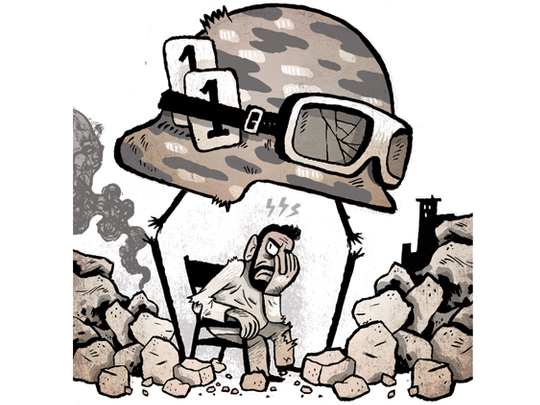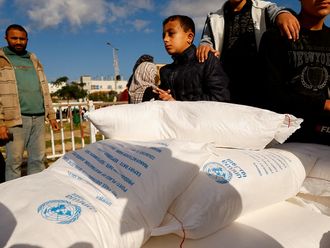
Eleven years ago, a friend told me not to mind the invasion and occupation of Iraq as this may be the price we would have to pay for Iraq to become as good as California. I never spoke to him again or to any supporter of the occupation because deep in my heart, I knew that Iraq would be lucky to remain in the condition of early 2003. As the ugly 11th anniversary of the occupation came and went earlier this month, does anyone believe that we are on our way to the promised California dream?
The Geneva International Centre for Justice (GIJC), reporting on the recent 25th session of the Human Rights Council of the United Nations, summed it all by saying it was “time to end the impunity” and a time to documenting human rights violations in Iraq while citing “the disastrous impact of the 2003 war and occupation”, which is still being felt, perhaps more severely.
The GICJ reported on “the suffering of Iraqi people from a high toxic level of lead, mercury contamination and depleted uranium pollution in many regions, which led to indirect killings of many innocent people” and called for the rectifying of these injustices saying the Iraqi people “are still waiting in vain for an official apology, for compensation to be paid, or [for] the responsible to be held accountable”.
Under the pretext of fighting terrorism, large cities are under siege and being pounded by heavy guns from the air and ground with many other parts of the country witnessing severe violence and hundreds of thousands being uprooted from their homes.
I could go on and on but suffice it to say that we are now at the level of cutting water resources from one region of Iraq to another as an additional sign of further fragmentation of the Iraqi people under the system brought on by the occupation.
UN Secretary-General Ban Ki-moon and Navi Pillay, the UN High Commissioner for Human Rights, were active participants in the GIJC meeting. However, they should be asked why, under such circumstances, did the UN Security Council issue unreserved statements supporting the Iraqi government in its alleged war against terrorism?
But what can we do when even President Barack Obama now justifies the occupation of Iraq and praises the US on how it conducted itself there? Will someone tell Obama about the destruction of our health and education systems or the state of our judicial system, which is now subservient to the government?
We still hear some honourable voices in the West against the occupation and its aftermath but these voices are almost mute now compared to what they were before the war.
Can I say that the Iraqi people are losing faith in the universality of justice and human rights? I hope that one day the perpetrators will be brought to justice for what they deliberately did to a country that was functioning, despite 13 years of war and crippling sanctions.
These sanctions, together with the invasion, were designed “to dismantle the Iraqi state to remake it as a client regime” according to Raymond William Baker, professor of International Politics, Trinity College, Hartford, US and Director, International Council for Middle East Studies.
He goes on to say that “targeted assassination of over 400 academics, kidnapping and the forced flight of thousands of doctors, lawyers, artists and other intellectuals add up to cultural cleansing” and that all these actions were planned and not random.
Jason Diaz of www.antiwar.com said on the anniversary: “Iraq is a wreck and war is largely forgotten.” And, on US involvement, “between the weapons shipments and constant calls from hawks to return to a direct military role inside Iraq, the US seems less ‘out’ of Iraq than any time since they physically withdrew, and are looking forward to years of intervention in various forms”.
I thought ‘looking forward’ is something positive.
A few years ago, the body count in Iraq was over a million and we stopped counting because nobody bothered. Now we talk about 8,000 dead as a result of direct violence in 2013 and a toll of 2,000 in the first quarter of 2014.
Katrina Vanden Heuvel writing in The Nation on March 15, 2014, said: “Iraq today is a broken and failing state: the war that many would prefer to believe ended in 2011 continues unabated, with Iraqis continuing to suffer, as much as ever, the fallout from this country’s [America’s] callous lies and avoidable mistakes.”
Former US president Jimmy Carter said: “The rest of the world, almost unanimously, looks at America as the No 1 warmonger. That we revert to armed conflict almost at the drop of a hat — and quite often it’s not only desired by the leaders of our country, but it’s also supported by the people of America.”
Will the next anniversary be worse? Perhaps yes.











